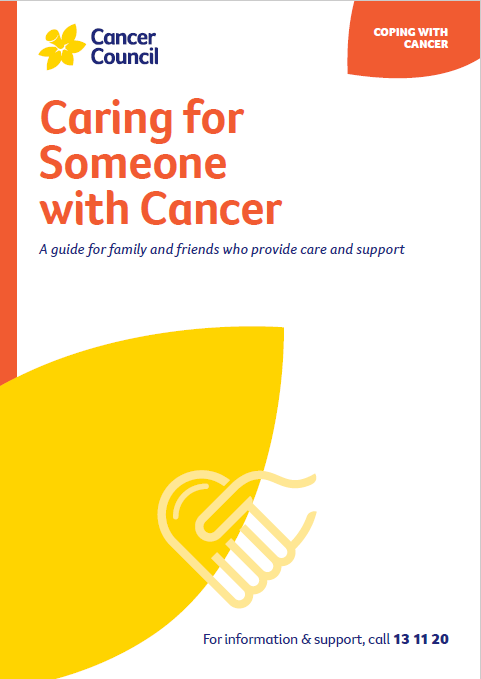- Home
- About Cancer
- Supporting someone with cancer
- Caring for someone with advanced cancer
- Caring at the end of life
Caring at the end of life
It can be confronting to talk about death and dying, but it is important to discuss the options for where the person may want to die and to understand their wishes. As the carer, your wishes also need to be considered. Talking about the options early, while the person is still well, can help avoid rushed decision-making, distress, and regrets or feelings of guilt later.
Learn more about:
Overview
Many people say that they would like to die at home. Carers may want to respect the person’s wishes, but may feel worried because they don’t know what to expect. Although dying is a natural process, few people have experience or knowledge of looking after someone who is dying.
Dying at home is possible with planning and support. Finding out more about the support available from the palliative care team and other services may help you feel more comfortable. It can be helpful to have a backup plan ready in case the person’s medical needs increase and they need to move to a palliative care unit or hospital near the end.
Not everyone wants to die at home, and some people change their minds as their illness progresses or their medical needs increase. People may choose to receive end-of-life care in a hospital, palliative care unit (hospice) or residential aged care facility. Some carers feel guilty about handing over the everyday care to others, but it can allow you to spend more time just being together. If you wish, you can assist the staff with physical tasks.
For more about the options at the end of life, call Cancer Council 13 11 20, or see Facing end of life.
When I see him struggling and he’s had a really rough time, it’s hard to just think maybe it will be easier for him to just die in his sleep. We can talk about that, and it’s reassuring for both of us to put that into words.
Susan
How to support someone in distress
If an illness is ongoing or causing uncomfortable symptoms, some people may become distressed. This may be because they feel particularly ill, or scared or guilty about the strain they are putting on others. Some people become distressed because symptoms such as pain, nausea or breathlessness are not well controlled. Others may experience emotional distress, anxiety or depression. If the person you are caring for is becoming distressed, encourage them to discuss how they’re feeling with a doctor or counsellor.
Pain and depression can almost always be treated, and help is generally available for other symptoms. It is important that you talk to the health care team about any emotional or physical symptoms that are causing the person with cancer distress, and find ways to make their final days more comfortable.
If you urgently need somebody to talk to because the person you are caring for is in emotional distress, call Lifeline on 13 11 14 at any time.
Anticipatory grief
Some carers experience anticipatory or pre-loss grief. This is the grief you feel when you are expecting the death of someone close to you.
You may also feel anticipatory grief if the person you are caring for undergoes a change such as long periods of confusion or reduced consciousness. Although they are still physically present, you may feel as though you have somehow already lost the person that you love. This form of grief is a natural reaction to a very difficult situation.
You may feel sad, down and depressed or become anxious and concerned for your family member or friend. Or you may find yourself preparing for the loss and beginning to think about what life might be like once they are gone. It is common to have thoughts such as: “How will it be when they are not here? How will I cope on my own?” This doesn’t mean you are a bad or uncaring person. These responses and thoughts are natural.
There is also the grief for a life not led, and the loss of the future you may have imagined or hoped for with that person, and that things have not worked out as you had planned.
→ READ MORE: Ways to say goodbye
Podcast: Caring for Someone in Their Last Months
Listen to more of our podcast for people affected by advanced cancer
More resources
Dr Alison White, Palliative Medicine Specialist, Royal Perth Hospital, WA; Tracey Bilson, Consumer; Louise Dillon, Consumer; Louise Durham, Nurse Practitioner, Palliative Care Outpatients, Princess Alexandra Hospital, QLD; Katrina Elias, Carers Program, South Western Sydney Local Health District, NSW Health, NSW; Jessica Elliott, Social Worker, Youth Cancer Services, Crown Princess Mary Cancer Centre, Westmead Hospital, NSW; Brendan Myhill, Social Worker and Bereavement Research Officer, Concord Repatriation General Hospital, NSW; Penny Neller, Project Coordinator, National Palliative Care Projects, Australian Centre for Health Law Research, Queensland University of Technology, QLD; Olivia Palac, Acting Assistant Director, Occupational Therapy, Gold Coast University Hospital, QLD; Nicole Rampton, Advanced Occupational Therapist, Cancer Services, Gold Coast University Hospital, QLD; Shirley Roberts, Nurse Consultant, Medical Oncology, Northern Adelaide Cancer Centre, SA; Dr Elysia Thornton-Benko, Specialist General Practitioner, and UNSW Research Fellow, NSW; Kathleen Wilkins, Consumer; Helen Zahra, Carers Program, South Western Sydney Local Health District, NSW Health, NSW.
View the Cancer Council NSW editorial policy.
View all publications or call 13 11 20 for free printed copies.

